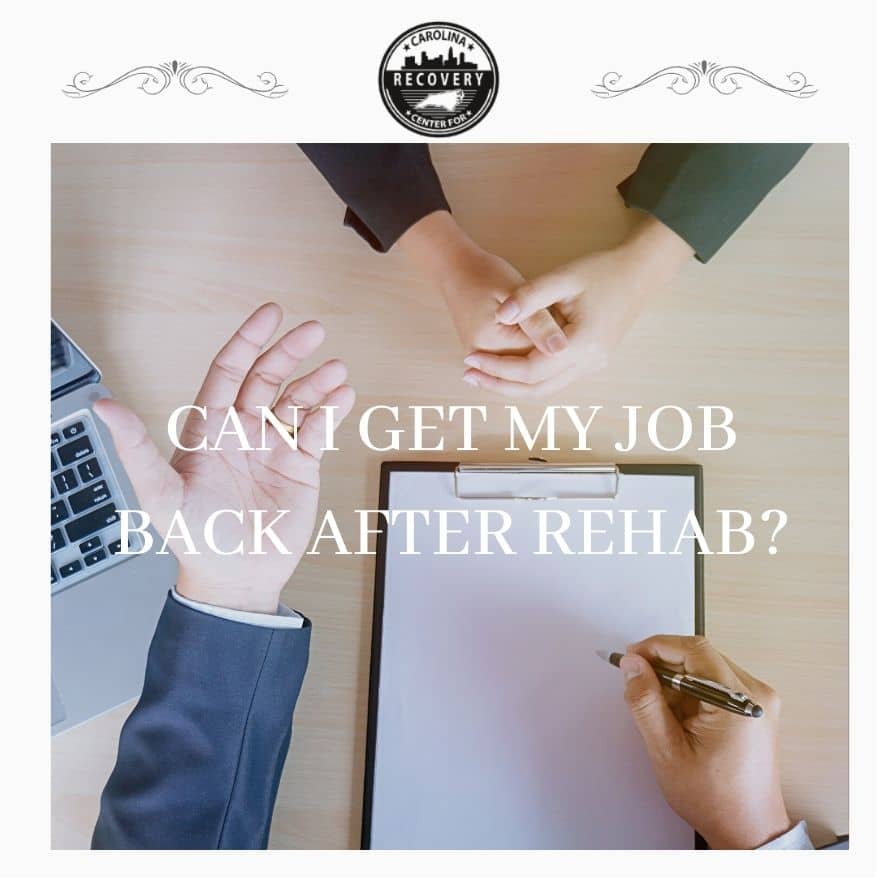Can I Get My Job Back After Rehab?

Medically Verified: 2/1/24
Medical Reviewer
Chief Editor

All of the information on this page has been reviewed and verified by a certified addiction professional.
Living with an addiction to drugs or alcohol can be full of challenges. It can negatively impact every aspect of your life, from your mental and physical health to your relationships and job performance.
Many people with addiction require comprehensive substance abuse treatment to recover from the condition. While treatment can be effective in giving people a new lease on life, several significant barriers can prevent people from seeking the treatment they need.
Some people may worry about the stigma surrounding substance abuse and addiction. Some may be concerned about taking time away from their families or worry about how to pay for treatment. But one of the biggest concerns people may have is that they will lose their job if they take time away to seek treatment.
Getting treatment is beneficial to people with addiction and their employers. Living with addiction can impact a person’s ability to function well in their daily life and be a productive worker. It is in an employer’s best interest to support their employees’ decision to seek treatment. And in some cases, employees may have legal protection to prevent them from losing their job while seeking care.
Understanding your rights can help you make informed choices about your employment as you prepare for rehab.
Types of Addiction Treatment
Addiction treatment programs are offered in many settings and in several levels of care. Before beginning treatment, a doctor or addiction specialist will evaluate you to determine which type of treatment you require.
Generally, you will have the choice between inpatient/residential treatment or an outpatient program. You may also participate in partial hospitalization or intensive outpatient treatment programs. During inpatient rehab, you may not be able to work, so it’s important to take time off and take steps to secure your employment. But if you are attending an IOP or OP your therapy sessions will be flexible enough to allow you to continue working while receiving treatment.
Deciding to seek substance abuse treatment can be a life-changing choice. During treatment, you will get the medical and emotional support you need to overcome addiction. You will gain the skills you need to avoid relapse in the future. This will prepare you to live the healthy, fulfilling lifestyle you choose.
Can You Get Your Job Back After Rehab?
When you decide to go to rehab, it is essential that you feel comfortable in your decision and can focus on your recovery completely during treatment. Worrying about losing your job may prevent you from being able to do this.
In many cases, you may be able to get your job back after rehab. Taking the right steps before beginning treatment can help you and your employer feel confident about your return to work afterward.
Before starting rehab, follow these steps:
- Have a doctor or medical professional evaluate your need for treatment and recommend a program or level of care.
- Find a treatment program that can meet your needs.
- Talk to your boss or Human Resources representative about job protection during addiction treatment
- Work with your boss to provide coverage during your leave of absence, if possible.
- Update your boss or coworkers about the status of any unfinished work.
- Access your company’s Employee Assistance Program (EAP) and other workplace resources, if possible.
- Plan your re-entry to work, including a proposed return date. Consider creating a Return-to-Work document to formalize your plans.
- During treatment, communicate with your boss or coworkers, if possible. Let them know of any changes in your plans to return to work.
By taking these steps, you will communicate to your employer that you feel confident in your decision to seek treatment and your ability to recover from addiction.
Understanding Your Options: Job Protection During Addiction Treatment
Living with an untreated addiction to drugs or alcohol can lead to severe harm to your mental and physical health. It can strain relationships and lead to legal and financial trouble. Addiction can also keep you from functioning well in your daily life, including work. The majority of addicted people are employed. People who abuse substances at work are more likely to cause accidents, have interpersonal difficulties, and have unexplained absences than those who do not.
Getting treatment is the best way to work towards a fulfilling, healthy life–including better performance at work. Many employers support their addicted employees getting the treatment they need to recover from addiction.
Legal job protection during addiction treatment also exists. There are two laws that protect employees’ jobs while seeking treatment.
American Disabilities Act (ADA)
This law protects people from discrimination based on mental illness, disability, or addiction.
Family Medical Leave Act (FMLA)
The Family Medical Leave Act allows employees to take a leave of absence to receive treatment for addiction or mental illness. Under this law, you may be eligible to take up to 12 weeks of unpaid leave from work without fear of losing your employment.
You must meet certain criteria to be eligible to take a leave under FMLA. These include having worked for your employer for at least 12 months, having worked for a minimum of 1,250 hours, and having at least 50 employees at your company.
Before beginning treatment, talk to your boss or Human Resources representative about your company’s policy on job protection during addiction treatment.
Get Help Now
Before you can focus on getting your job back, it’s important to take care of yourself by getting sober, first. If you or a loved one are ready to begin your recovery, reach out to the specialists at the Carolina Center for Recovery today.

